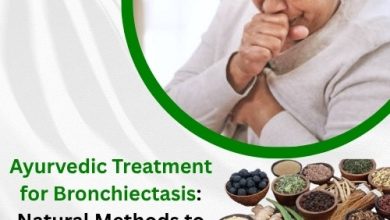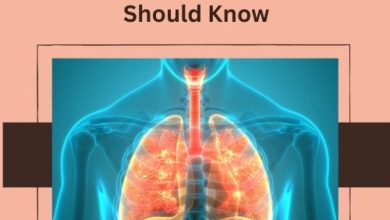Best and Worst Foods for Bronchiectasis: Eat Smart to Breathe Easier

Living with bronchiectasis can be challenging, especially when symptoms like persistent coughing, breathlessness, and frequent infections interfere with daily life. While medications, physiotherapy, and medical interventions play crucial roles, the importance of food choices is often overlooked. Choosing the right diet can help reduce inflammation, manage mucus production, and support immune function.
Knowing what foods are good for bronchiectasis and which ones worsen symptoms can make a meaningful difference in how you feel day to day. Here’s a practical breakdown to help you make smarter choices.
What Foods Are Good For Bronchiectasis?
1. High-Antioxidant Fruits and Vegetables
Fresh fruits and vegetables rich in antioxidants can reduce oxidative stress and inflammation in the lungs.
Best picks:
- Berries (blueberries, raspberries, blackberries): Packed with vitamin C and flavonoids.
- Leafy greens (spinach, kale, rocket): Rich in vitamins A and C.
- Broccoli and Brussels sprouts: Contain sulforaphane, known for lung-protective effects.
- Carrots and sweet potatoes: High in beta-carotene, which the body converts to vitamin A.
2. Omega-3 Fatty Acids
Omega-3s have strong anti-inflammatory properties, helping reduce airway inflammation.
Best picks:
- Fatty fish like salmon, sardines, and mackerel.
- Chia seeds and flaxseeds.
- Walnuts.
Including omega-3-rich foods in your weekly meals supports immune regulation and may lessen the frequency of flare-ups.
Related Article: Natural Remedies for Bronchiectasis Diet and Lifestyle Advice
3. Lean Protein Sources
Protein supports muscle strength, especially important for those managing chronic coughs and physical fatigue.
Best picks:
- Skinless poultry.
- Legumes such as lentils, chickpeas, and beans.
- Eggs.
- Tofu and tempeh.
Maintaining adequate protein intake helps preserve respiratory muscle function, which is key for breathing efficiency.
4. Whole Grains
Whole grains are an excellent source of B vitamins and fibre, supporting both energy levels and gut health.
Good options include:
- Brown rice.
- Quinoa.
- Oats.
- Barley.
These grains release energy slowly, helping avoid sudden energy dips and supporting sustained activity throughout the day.
Related Article: Bronchiectasis Relief can be found in Natural Treatment
5. Hydrating Foods and Plenty of Water
Staying hydrated thins mucus, making it easier to clear from the lungs.
Helpful options:
- Water-rich fruits like melon, oranges, and cucumber.
- Herbal teas.
- Broths and clear soups.
Aim to drink six to eight glasses of water daily unless otherwise advised by your healthcare provider.
6. Fermented Foods for Gut Health
A healthy gut microbiome supports the immune system and can improve your body’s response to infection.
Options to include:
- Yoghurt with live cultures.
- Kefir.
- Sauerkraut (unsweetened).
- Miso.
These foods contain probiotics that support overall immunity, which can be helpful for those prone to respiratory infections.
Related Article: Herbal Supplement for Bronchiectasis: 10 Best Herbs for Naturally Improving Symptoms
What Foods Are Bad For Bronchiectasis?
Just as certain foods can support lung health, others may trigger inflammation, excess mucus, or digestive issues that aggravate bronchiectasis symptoms. It’s essential to identify what might worsen your symptoms so you can make informed choices.
Foods to Avoid With Bronchiectasis
1. Dairy Products (In Some Cases)
Some people with bronchiectasis report increased mucus after consuming dairy. While evidence is mixed, if you notice worsened congestion or coughing after dairy intake, it may be worth reducing it.
Caution with:
- Full-fat milk.
- Cream.
- Cheese.
- Ice cream.
Try lactose-free alternatives like oat or almond milk if symptoms persist after dairy consumption.
2. Refined Sugar and Sweets
Excess sugar can fuel inflammation and weaken immune responses, making infections more likely.
Avoid or limit:
- Soft drinks and sugary juices.
- Cakes, biscuits, and pastries.
- Sweetened cereals.
High sugar intake can also lead to weight gain, which may place additional strain on breathing.
3. Processed and Fatty Meats
Foods high in saturated fat and preservatives can contribute to inflammation and strain on the lungs.
Best avoided:
- Sausages.
- Bacon.
- Salami.
- Ready-made meat pies.
These foods offer little nutritional value and may trigger inflammation, worsening bronchiectasis symptoms over time.
Related Article: Foods to Avoid and Foods to Include in a Bronchiectasis Diet
4. Fried and Greasy Foods
These can increase stomach acid and reflux, which can lead to aspiration and worsen lung health.
Try to avoid:
- Deep-fried chips.
- Fried chicken.
- Takeaway fast food.
Eating smaller portions of grilled, baked, or steamed foods instead helps reduce the risk of indigestion and reflux.
5. Excess Salt
Salt promotes water retention, which can increase blood pressure and strain your cardiovascular system. For people with bronchiectasis, high salt can also thicken mucus.
Watch out for:
- Tinned soups with added salt.
- Salted snacks like crisps.
- Store-bought sauces and dressings.
Choose low-sodium versions and use herbs and spices to flavour food instead.
6. Alcohol
Alcohol weakens the immune system and can lead to dehydration, both of which are unfavourable for bronchiectasis.
Regular consumption can also interfere with medications or physiotherapy routines. Occasional light drinking may be acceptable, but discuss limits with your healthcare team.
Bronchiectasis Foods to Avoid: Quick Reference List
Here’s a concise list of bronchiectasis foods to avoid for easier planning:
- Full-fat dairy (if it worsens mucus)
- Processed meats (sausages, bacon)
- Deep-fried foods (chips, takeaways)
- Sugary snacks and drinks
- High-salt packaged foods
- Excessive alcohol
- White bread, pasta, and rice (opt for wholegrain)
Each person reacts differently, so tracking your food and symptoms in a diary can help identify personal triggers.
Related Article: Fuelling Your Lungs: A Nutrition Guide for Bronchiectasis
Eating Habits That Can Support Lung Health
In addition to choosing specific foods, your overall eating habits matter. Here are a few habits that support better breathing and symptom control:
1. Eat Smaller, More Frequent Meals
Large meals can press on the diaphragm and make breathing more difficult. Eating smaller portions spaced evenly throughout the day helps maintain energy without strain.
2. Avoid Lying Down After Meals
Reflux can aggravate coughing and worsen lung irritation. Try to stay upright for at least 60 minutes after eating.
3. Cook Fresh When Possible
Home-cooked meals are usually lower in salt, sugar, and unhealthy fats. Try batch cooking or using a slow cooker to make preparation easier.
4. Track Your Triggers
Some people may notice that specific foods consistently make their symptoms worse. Keeping a food and symptom journal helps you spot patterns.
Sample Day of Bronchiectasis-Friendly Meals
Here’s an example of how to structure a day’s eating with foods that support your lungs:
Breakfast:
- Porridge with flaxseeds, blueberries, and almond milk.
- Herbal tea or warm water with lemon.
Mid-Morning Snack:
- Handful of walnuts.
- Slices of apple or pear.
Lunch:
- Lentil and vegetable soup with wholegrain toast.
- Side of steamed broccoli and carrots.
Afternoon Snack:
- Plain yoghurt with live cultures and honey (if tolerated).
- Herbal tea.
Dinner:
- Grilled salmon with quinoa and roasted sweet potatoes.
- Leafy green salad with olive oil and lemon dressing.
Evening:
- Chamomile tea and a slice of melon.
Summary
Understanding what foods are good for bronchiectasis and making smart choices about what to avoid can support better breathing, reduce mucus production, and improve your energy levels. Stick to whole, fresh ingredients with plenty of antioxidants, protein, and healthy fats, and avoid processed, sugary, and greasy foods where possible.
Your diet isn’t a cure, but it’s a powerful part of your management plan. If you’re still unsure what to eat, speak with a registered dietitian or your respiratory team for advice tailored to your needs.
To learn more about specific foods that may help ease symptoms, check out our related article on what foods are good for bronchiectasis.




